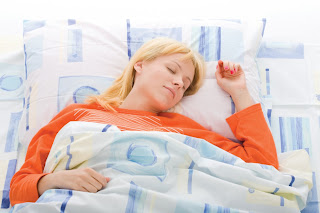
Sleeping for eight hours a night is the secret to not putting weight on, according to scientists. They found that those who slept for less than six hours a night put on more weight than those who slept for seven or eight hours each night.
The research published in the Journal Sleep found those who did not get enough sleep gained almost 4.4lbs (2kg) compared to those who slept for the recommended number of hours. Short sleepers were 27% more likely to become obese than those had an average night’s sleep.
The reason that the amount of sleep a person gets can govern their weight is because sleep affects hormone levels, especially those involved in appetite and feeling full after a meal. We release less leptin, a hormone that signals the state of fat stores, and more ghrelin, a hormone that signals hunger. So without enough shut-eye, we’re likely to start overeating.
The sleep/wake cycle
Our natural sleep/wake cycle is called the circadian cycle or rhythm, and is the 24 hour period of when we wake, sleep and feel hungry. It is influenced by light, noise, pressure to perform, food and individual biochemistry. One important hormone controlled by circadian rhythms is melatonin, and the more you produce, the sleepier you feel and the deeper your sleep can be.
If you don’t normally go to bed until 11pm or later, you probably won’t be producing enough to go to sleep any earlier, at least not until you can ‘shift’ your day back to the left, rather like changing time zones. Not only that but any pressure on you increases the production of the stress hormones (adrenaline, noradrenaline and cortisol) which increases your alertness and readiness for action, which obviously affects whether you can sleep at all.
In an ideal cycle, our ‘get up and go’ stress hormones are released in the morning during activity and begin to decrease later in the day. Then in the evening and at night, the immune system, physical and psychological repair phases take place.
If you are someone that works late and into the night, your stress hormones are present for much longer. Going to bed late misses vital repair to your cells and immune system that you cannot get back. The end result normally consists of being run down and susceptible to becoming ill if it becomes a regular event.
Factors that disrupt your sleep/wake cycle
- Stimulants – caffeine, sugar, alcohol and food additives
- Diet – eating too heavily close to bedtime. Your body can’t sleep deeply if it has to concentrate on digesting food
- Exercise – try to avoid exercise within an hour of going to bed as it disrupts sleep if your core temperature is too high
- Lighting – including watching tv (it is still a light source and too stimulating
- Noise – traffic, snoring, neighbours
- Electromagnetic pollution – from electrical appliances
- Get to sleep by 10.30pm (as much as possible)
- Minimise your exposure to bright lights for at least two hours before going to bed and sleep in a room that is completely dark
- Avoid the consumption of stimulants after lunch
- Drink plenty of water
- Exercise (but not too close to bedtime)
- Unplug or remove all electrical appliances near your bed and avoid charging your mobile phone at night in your room
- Buy earplugs to cut out noise from traffic or snoring
- Dejunk and declutter your room and make it a work free zone – no briefcases or laptops!
- Try a relaxation cd to get to sleep
- Don’t turn on the light (unless it would be dangerous for you not to!) as you’ll start your wake cycle. The body cannot distinguish between light from a bulb and natural sunlight.
- Don’t look at the clock! You’ll start calculating the hours left till the alarm goes off and just become more alert. Turn it away from you.
- Don’t lie awake being angry about it. Choose something specific to focus on like waves lapping a shore, soft clouds or whatever keeps you in a sleep-like state.
www.boffosbootcamp.com